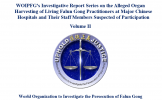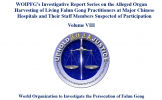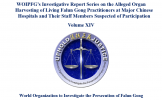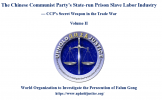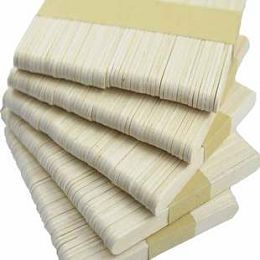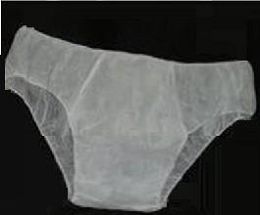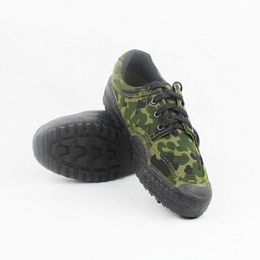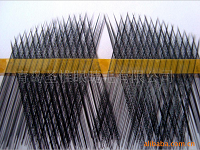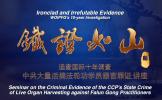WOIPFG’s Investigative Report on the Falun Dafa Practitioners’ Coerced Production of Forced Labor Products in the Chinese Communist Party’s Prisons and Labor Camps(part 1)
Go to Part 2 ›
Part 1 table of Contents
Forword
Ⅰ. Slave Labor Production in Mainland China: Forms and Scale.
(I) Prisons with Slave Labor Production in the Name of an Enterprise
(II) Prisons, labor camps and detention centers that produces slave labor products and the companies that commission their services
1. Slave labor products produced in prisons and the companies that commission them
1.1 Hangzhou Z-shine industrial Co., Ltd. relies on 38 prisons for production
1.2 Zhejiang Province No. 1, No. 4, No. 5 and No. 7 Prisons and Quzhou Haolong Clothing Co., Ltd
1.3 Jiamusi Prison and Zhejiang Goodbrother Shoes Co., Ltd
1.4 Liaoning Province Women’s Prison and related companies
1.5 Shanghai Women’s Prison and related companies
1.6 Heilongjiang Tailai Prison and South Korean brand MISSHA
1.7 Shanghai prisons, Shanghai forced labor camps and related companies
1.8 Collaboration between Shanghai Tilanqiao Prison and Shanghai Soap Co., Ltd., Shanghai Jahwa Corporation
The initial information collected by World Organization to Investigate the Persecution of Falun Gong (WOIPFG) indicates that severe abuse of slave labor exists in the prisons and existed in the now-abolished labor camps of the Chinese communist regime. And those who work under enslavement, aged between 16 and 70, include Falun Gong practitioners, as well as human rights activists and righteous lawyers, who have the courage to speak for vulnerable groups and fight the authorities for justice. Within barbed wires and prison walls, they are forced to work painstakingly between 12 and 19 hours a day. When production requires, they would have to work “overnight” for even more hours; sometimes they cannot sleep for several days in a row, in order to fulfill their taxing “production assignments”.
The enslaved individuals endure unspeakable and unimaginable physical and mental sufferings, adverse living conditions, punishments and even tortures, which challenge their physiological and psychological limits. Many of them have contracted various diseases or become incapacitated due to persecution; some have even perished under persecution. They have produced over 100 varieties of slave labor products, many of which are brand-name and fashionable ones, in almost all aspects of people’s lives, such as food, clothing, household products, transportation, entertainment products, cosmetics, wedding gifts, as well as goods used for sacrifices and festivities. In addition to China, the products have also been sold in many other countries and regions, including the United States, Australia, India, the United Kingdom, Japan, South Korea, Russia, Germany, Africa, Turkey, Italy, the Arab world, Malaysia, Canada, Hong Kong, Macao and Taiwan.
On June 18, 1998, at its closing meeting of the 86th session, the International Labor Organization adopted the ILO Declaration on Fundamental Principles and Rights at Work, which points out clearly the need to eliminate “all forms of forced or compulsory labor”. As a participating member of the International Labor Organization, instead of carrying out the Organization’s provisions, China has adopted many preferential policies for the businesses within its labor camp and prison systems, while encouraging the growth of such industries and attracting foreign investments for them. Protected by such preferential policies, businesses located in the economic development zones of some provinces and cities even try to attract foreign investments by advertising the cheaper labor from the imprisoned individuals, which has resulted in an alarming expansion of slave labor enterprises. For example, Hangzhou Z-shine industrial Co., Ltd. now has 38 prisons as its production units, with more than 40,000 prisoners manufacturing fabrics and clothes for exports, and 90 percent of their products are sold overseas.
This investigative report represents only the tip of the iceberg of the slave labor reality under the Chinese communist regime. The problems it identifies, however, have an impact on the whole society, which is of deep concern. What is happening in the communist China is not only a violation of the enslaved laborers’ human rights, but also an affront to the human morals and conscience. It also poses a danger to the international community. Indeed, the slave labor industry under the Chinese communist regime exists and grows with the international community’s collaboration. WOIPFG published two reports on October 16, 2003[1] and April 5, 2004[2] respectively, revealing the hidden slave labor production under the Chinese communist regime and its impact on international markets. In addition, WOIPFG submitted a report 10 years ago to the US government, requesting a ban on the import of certain products made in labor camps. However, our efforts were not successful. Jobs in many countries, including those in the United States, have been lost to the enslaved workers in China, thus worsening the Chinese communist regime’s persecution of human rights. In other words, the international community has both a moral obligation and its own economic interests in keeping a close watch on the human rights issues in China. WOIPFG is calling on the international community to pay attention to and stop the enslaved labor under the Chinese communist regime.
Ⅰ. Slave Labor Production in Mainland China: Forms and Scale
There are mainly two forms of slave labor production in mainland China’s prisons, labor camps and
detention centers. The first one is the slave labor production carried out directly in the name of an
enterprise; the other one is attracting domestic and foreign companies to outsource their production
to prisons and other places with cheap slave labor.
(I) Prisons with Slave Labor Production in the Name of Companies
The following table lists some of the jails attracting business in the name of enterprises.[3]All
products manufactured by this type of companies are slave labor products.
| NO | PRISON NAME | ENTERPRISE NAME | PRODUCT INFO | CONTACT INFO |
| 1 |
Deyang Prison in Sichuan |
Deyang Jiuwu Factory in Sichuan Province | Plush toys (labeled in English, French and German) exported to Europe and the United States | Address: Huangyang Town, Jingyang District, Deyang City, Sichuan Province |
| 2 | Shanxi Women’s Prison | Shanxi Province Chemical Factory | Gift bags, Chinese knots, handmade car seat cushions, products for exports, including butterflies, knit sweaters, handbags, wigs and file boxes | Address: Yuci District, Jinzhong City, Shanxi Province Tel: 0354-3299800 Fax: 0354-3299790 Email: shanxinvjian@sina.com |
| 3 | Baoding Prison in Hebei Province | Hebei Province Machine Tool Factory | ||
| 4 |
Fanjiatai Prison in Shayang County, Hubei Province (see Figure 1) |
Hubei Province Shayang Xinsheng Brick and Tile Factory |
Hubei Province Shayang Xinsheng Brick and Tile Factory is located within Fanjiatai Prison in Shayang County, Hubei Province, and it is a state-owned enterprise. Its registered capital is 3.98 million yuan, with 800 employees. The factory mainly manufactures and sells bricks and tiles. Also, as a branch of Hubei Province’s “Shayang Farm Processing Plant”, it carries out a lot of slave labor business for this company.[4] (In January 2011, Fanjiatai Prison started to process a large number of “liberation shoes” for the No. 3517 Arsenal in Yueyang City, Hunan Province. The prison only processes the upper parts of the shoes [vamps and soft soles], and the rubber bottoms are processed by another prison. The arsenal has moved its processing machinery and equipment to the prison. Each prison section is responsible for some processes of the assembly line. For instance, the fourth prison section is responsible for punching eyestays and fastening rivets on the shoes. The individuals from the first, second and fourth prison sections work in the fourth section’s canteen. With sewing machines, punching machines, cutting machines and other mechanical equipment placed there, the canteen has become a workshop capable of accommodating 2,000 people. The shoes processed by the prison have been exported overseas.[5 |
Contact: Feng Weiguo (legal person)
|
| Hubei Province Shayang Xinyuan Industry & Trade Co. Ltd. | ||||
| Shayang Farm Processing Plant of Hubei Province, Fanjiatai branch |
1. Jewelry processing: hand-stitching sequins, processing bracelets, necklaces and strings of beads, drilling, manual thread winding, tying ribbon jewelry knots and polishing crystal balls; 2. Garment, shoe and hat processing: garment processing, sewing beads on handbags, stitching beads on laces, embroidering beads on clothes, weaving shoe leathers, gluing leathers without woven fabrics, and stitching footballs; 3. Electronic product processing: electronic product assembly, simple component welding; 4. Assembly, packaging and processing: toy assembly, rain gear processing, product packaging and assembly. (see Figure 2) The finished products are shipped to Zhejiang Province, repackaged carefully there and then shipped to Taiwan, and later exported to the US from Taiwan. In addition, the prison processes embroidered flowers on window screens for a southern Chinese company: the individuals would stick or embroider plastic, metal and nylon flowers and beads onto some over 10-meter-long window screens, according to the designed patterns. These are later exported to South Africa or other African countries.[6] |
In Shenzhen, there is a male clerk surnamed Mao, who is in charge of developing the prison’s slave labor business. Address: No. 26 East Ring First Road in Longhua Town, Bao’an District of Shenzhen City, Guangdong Province.Mobile: 13794889528Tel: 0755-81758132Fax: 0755-81758132 The company’s investment-attracting advertisement states, “We undertake all types of manual processing business and outsourced manual processing work”, “regardless of the assignments’ processing complexity, technical difficulty or the level of craftsmanship.” |
||
| 5 | The third (later changed to “first”) prison section of Liaoning Province Women’s Prison | Shenyang Ningda Garment Factory | The former third prison section (changed to “first” section in 2011) is called “Shenyang Ningda Garment Factory” in public. It is under Liaoning Lanfang Clothing Co., Ltd. It performs assembly line work and has the longest history of garment production in this prison. Its products are exported to Europe, the United States and other countries, hence it is also called “export prison section”. Its main partner manufacturers are “Shenyang Anna Garment Group” and “Zhonghe Clothing Co., Ltd”. It also produces military/police uniforms all year around. The products it processes for Shenyang Anna Garment Group include pencil pants, plaid shirts, shorts and skirts. The pencil pants and some shorts are produced for the South Korean brand Bangbang. In recent years, plaid shirts are popular on the market, so this prison has produced a considerable number of plaid shirts. The products it processes for Zhonghe are mainly padded winter clothes and overalls for the police or janitors, with some of them having silver reflective strips. And these products are exported to Canada. Sometimes, the prison processes ski suits, Jack Daniel’s padded jackets and Mickey-style children’s clothes.[7] | |
| 6 | The Inner Mongolia Autonomous Region Women’s Prison | Xinghua Garment Factory |
After the Inner Mongolia First Women’s Prison and the Inner Mongolia Second Women’s Prison were both relocated to Shuaijiaying Village of Hohhot City in November 2003, both prisons combined and became the Inner Mongolia Autonomous Region Women’s Prison, located in Shuaijiaying Village. The prison manufactures uniforms for China’s public security, industrial and commercial agencies. It also adorns embroidery on sweaters, makes fringes for scarfs, picks loose wool and small objects off sweaters, packages disposable chopsticks and toothpicks, and sorts buckwheat. The semi-finished products arrive at the prison, go through a finishing process and become end products with a “Made in China” label on them. Most of the products are exported to Japan and European countries. During the SARS outbreak, face masks were in short supply in mainland China. The prison had workers working 24-hour days producing large quantities of masks.[8] |
Address: Shuaijianying Village, Hohhot City, Inner Mongolia
|
| 7 | Shandong Province Women’s Prison | Shandong Province Xing-Ye Development Co. Ltd. | Prison sections 1, 3, 4, 5 and 8 process garments. Prison section 2 produces toys, and section 7 is a packing workshop. The prison authorities assigned police officers to bid for more contracts. Most contracts came from international trading companies and first-tier clothing suppliers to those trading companies. Large quantities of clothing and toys were exported to the US, Japan, South Korea, Russia, Germany and other countries. A number of brand-name products, including Pierre Cardin, were made in these prisons. When foreign trade contracts were low, the prison also took domestic contracts, including military and police uniforms and other merchandise. The prison received large orders from at least three brand names. One is ABC Children Clothes. The other is Charles River Apparel, a sports clothing brand. Their tags showed “export to the US.” The other products in large quantities included Reno shirts and Hansi down jackets (see Figure 3). The prison also used slave labor in making door curtains, glass beads, knitted sleeveless shirts, handbags, quilts, toys and Christmas trees, peeling garlic, packing pencils, bottling apple cider vinegar in mini glass bottles, labeling, packing, washing glassware and vases, and wrapping electrical coils.[9] | |
| 8 | Hebei Province Women’s Prison (formerly Shijiazhuang Prison) | Jintai Industrial Co., Ltd. | This prison has been making exportable garments for many years, such as black multi-pocket baggy pants and Mona Lisa long skirts exported to the United States, Canada and Australia. It has also produced many jeans. Both the Hebei Province Women’s Prison and the Hebei Province Forced Labor Camp process so-called disposable “hygienic” chopsticks. Due to the powdered Sanlu milk scandal in China in 2008, some unscrupulous companies have been mislabeling their products with bogus English labels to imitate imports to deceive consumers.[10] |
The predecessor of Hebei Province Women’s Prison – the former Hebei Province Shijiazhuang Prison - hang a plaque showing “Jintai Industrial Co., Ltd.” at its entrance. |
| 9 |
Jilin Provincial Prison AdministrationBureau |
Jilin Jixin Group Co., Ltd | The company’s registered capital is 92,885,700 yuan, and it has 13 subsidiaries. All of these subsidiaries are prisons, except Jilin Jixin Group Construction Company. Most of the workers are detainees. The company’s products range from mechanical and electrical equipment, chemical products, carpets, apparel, machinery, and handmade arts and crafts to mobile phone batteries, radiators, cement, construction projects, agricultural products (production and processing), and more.[11] |
Address: No. 1000 Xinfa Road, Changchun City, Jilin Province |
| 10 |
Changchun City’s Tiebei Prison |
Jilin Province Changchun Switch LLC |
(Information to be added) |
|
| 11 |
Changchun Northern Suburbs Prison |
Jilin Province Jiahuan Light Industrial Products Processing Co., Ltd. |
The company mainly produces and processes apparel, knitwear, handicrafts, carpets, crops, agricultural and sideline products. |
Located in Yijian Village, in the northern suburbs of Kuancheng District, Changchun City, Jilin Province
|
| 12 | Changchun Prison |
Jilin Huayuan Rubber Products Co., Ltd. |
The company covers 250,000 square meters of land. The factory alone is 40,000 square meters, and its office buildings are 10,000 square meters. And 50,000 square meters have been reserved for future industrial development. The company’s main products are cold glued shoes. They also manufacture and process apparel, wood carvings, craft birds, magnetic materials, machinery and more. This is a medium-sized enterprise, with 3,538 employees, including 540 professional and technical personnel and 2,994 technicians. They have 12 production units, with an annual output value of 40 million yuan. The shoe workshop produces 1.5 to 2 million pairs of shoes annually. The clothing workshop covers 5,300 square meters of land, and they have 40 technical staff members and 650 technicians, mainly working on the production and processing of uniforms, cotton clothes and casual wear. Some products are exported to Japan, South Korea and Southeast Asia. The workshop has 500 pieces of special equipment to produce apparel. 100,000 products are made each month. Their woodcarving and craft bird manufacturing workshop has a technical staff of 600, and the products are exported to Japan, South Korea and Southeast Asia.[12] |
Located at 2888 Xiaochengzi St. in the Kuancheng District of Changchun City, it was formerly known as Jilin Province Rubber Shoe General Factory. |
| 13 |
Xingye Prison in Changchun |
Jilin Jialu Industry & Trade Co., Ltd. |
The company covers 38,515 square meters of land, and the factory itself 12,580 square meters. Its main business operations include carton processing, garment processing, handicraft production and various semi-finished product processing and services. The company has 10 workshops and a technical staff of 1,200. Of the 10 workshops, three are automated, multi-function carton processing workshop units. There are several dozens of high-speed automatic printing, slotting and die-cutting machines, suction-type automatic slotting cut-off machines, suction-type automatic round pressure die-cutting machines and chain-type water-based printing presses. There is one advanced sweater knitting workshop, with most of its machines imported from South Korea, including 70 flat knitting machines, 40 disk stitching machines, 10 milling machines and over 100 various needle-shaped looping machines. The workshop is capable of producing a variety of beautiful sweaters that are exported to more than a dozen countries, including the United States, Japan and South Korea. There is one advanced garment processing plant. One workshop has advanced professional printing lines and design capability. There is one workshop manufacturing crafts with special features, and there are four workshops that simply process products.[13] |
Located at 2282 Yatai North Street, Changchun City, Jilin Province |
| 14 |
Heizuizi Women’s Prison in Jilin Province |
Jilin Province Xinyuan Apparel Limited Liability Company |
(Information to be added) |
|
| 15 |
Siping Prison |
Jilin Province Shiling Cement Co., Ltd. |
The company, officially established in 1999, has a registered capital of 32.7 million yuan. It is located in Shiling Town, Lishu County, 30 kilometers southeast of Siping City. They have two new outside kiln cement calcination production lines, generating 40 million tons of cement clinker and 65 million tons of cement annually. The company’s leading products are “Shiling” brand slag silicate 32.5 and 42.5 and ordinary silicate 32.5 and 42.5 cement. The annual sales revenue in recent years exceeded 80 million yuan, with an annual profit of more than 10 million yuan. Most of the workers are detainees. The work includes making light bulbs; grinding gemstones; making silk flowers and lobster clasps (a type of button; from 2003 to 2006), and popsicle sticks (2006 to 2008); assembling lighter heads (2008), making apparel, cell phone batteries and army boots; assembling filter beads; and making disposable underwear. (See Figure 4)[14] |
|
| 16 |
Meihekou Prison |
Jilin Province Haoyu Industry and Trade Co., Ltd. |
The company was established on June 4, 2002, with nine factory districts inside the plant and a staff of 1,700. The factory covers 8,000 square meters. The company mainly processes products, such as handmade carpets, knit sweaters and carved crafts. (see Figure 5).[15] |
Located within the jurisdiction of Meihekou City, Jilin Province, 40 kilometers southwest from Meihekou City and across the river from Chaoyang town, Huinan County |
| 17 | Jilin Prison |
Jilin Province Jialian Machinery Manufacturing Co., Ltd. |
The company was established in 2002. The company covers 200,000 square meters, the factory’s plant covers 30,000 square meters, and its office buildings cover 2,000 square meters. They have a staff of 3,200, with 330 mangers and over 200 technical staff members. The main operations are garment processing, machinery processing, carpet weaving, civil aluminum profile radiator manufacturing and the manufacturing of various individually-contracted hand-processed products. The garment processing workshop covers 3,000 square meters and has a technical staff of over 50 and 500 workers. They have more than 500 top of the line sewing machines, ironing machines and other advanced equipment. They are mainly engaging in the design and production of various types of clothing, including work uniforms, suits, exportable children’s wear, knitted garments and household bedding. The workshop is equipped with over 50 large or medium-sized general purpose machining units, including a T6160 floor type boring machine, a 6M open side planing machine, a gantry plane, a 1.6M vertical lathe, a 50 lathe, a slotting machine, a 1.25M gear hobbing machine and a milling machine. The welding production workshop has the capacity to process different kinds of auxiliary parts and to assemble components and complete appliances. The riveting and welding workshop is equipped with a 6m bending machine, a 5m shearing machine, a large-scale rolling and flat machine, an argon arc welder, a CO2 gas shielded welder, a shielded metal arc welder, etc. Its annual production capacity can reach 3,000 tons of rivets. The machining workshop and riveting and welding workshop are equipped with multiple 30-ton crown blocks as auxiliary facilities. The area of production sites in both workshops totals about 10,000 square meters, with more than 400 technical staff. The carpet weaving workshop covers 3,000 square meters and has over 400 weavers. They process all kinds of silk carpets, silk wool, silk hemp, silk velvet carpets and Tibetan carpets, with an annual output of 100,000 square feet.[16]
|
Located near Songhua River in the Chuanying District of Jilin City, Jilin Province.
|
| 18 |
Zhenlai Prison |
Jilin Province Sifang Agricultural Limited Liability Company |
(Information to be added) |
|
| 19 |
Yanji Prison |
Jilin Province Xiangrui Industry and Trade Co., Ltd. |
The company started to operate in April 2005. It mainly processes labor-intensive products. They have nine enterprises, making wood-based panels and nail, as well as weaving. They have a staff of over 1,200.[17] |
Address: 3195 Shenhua Street, Yanji City, Jilin Province |
| 20 |
Gongzhuling Prison |
Jilin Tai’an Industry and Trade Co., Ltd. |
The company covers 760,000 square meters. It produces wooden and iron art crafts, bathrobes and socks. It also does printing, mechanical processing, and rubber product processing, including slab rubber. Some rubber production equipment can be used to manufacture waterproof materials, and develop/produce new waterproof materials, such as rubber/plastics materials and tread rubber cloths.[18] |
Located on the south side of the State Highway 102 and Harbin-Dalian Railway, and near the exit to Sichang Highway. |
| 21 |
Yanji Qiuligou Prison |
Jilin Province Longxin Industrial Co., Ltd. |
The company was established on October 30, 2005. With fixed assets of 2.6 million yuan, its registered capital is 740,000 yuan. Its factory area covers 47,500 square meters, and the plant covers 4,000 square meters, with 25 hectares of cultivated land. It has 4 departments and more than 20 professional and technical personnel. It contracts foreign services/processing business, mainly engaging in carpet, sweater and plastic woven product exporting, as well as diatomite production. It has partnered with four domestic and foreign manufacturers. In 2012, its production output was 1.52 million yuan, and the labor service income was 1.82 million yuan.[19] |
Located in Qiuligou Town, Dunhua City, Yanbian Korean Autonomous Prefecture, Jilin Province, 20 km from the Dunhua urban area |
The following are some of the slave labor products or related images produced by the above-mentioned
prison systems:
Figure 1: Slave labor products manufactured in Fanjiatai Prison in Shayang County, Hubei Province
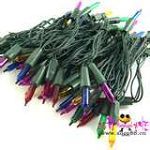 Christmas lights(exported to the US) Christmas lights(exported to the US) |
 Crystal stones (polished) |
Figure 2: Some of the slave labor products made by Hubei Province’s Shayang Farm Processing Plant (i.e. Shayang Prison Administration Bureau)[20]
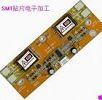
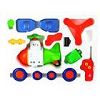
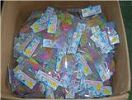
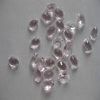

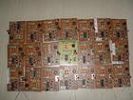




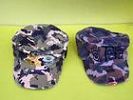
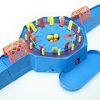

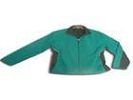
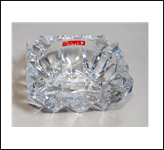
Figure 3: Brand-name products manufactured by Shandong Province Xing-Ye Development Co. Ltd. (Shandong Province Women’s Prison)
 Charles River Apparel sports casual wear logo |
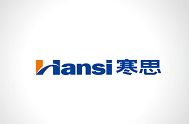 Hansi brand down jacket logo |
 Logo of Taiwanese children’s apparel brand ABC |
Figure 4: Some of the slave labor products produced by Jilin Province Shiling Cement Co., Ltd
|
|
|
| Popsicle sticks | Lobster claw clasps |
|
|
|
| Disposable non-woven underwear | Army boot uppers |
Figure 5: Some of the slave labor products produced by Jilin Province Haoyu Industry and Trade Co., Ltd. (belonging to Meihekou Prison)
|
|
 Tibetan sheep wool carpet |
 Rug |
 Carving |
The above images show the various raw materials used in production
1. Slave Labor Products Made in Prisons and the Companies that have Commissioned them
1.1 Hangzhou Z-shine industrial Co., Ltd. relies on 38 prisons for production
Hangzhou Z-shine industrial Co., Ltd. has been relying on apparel factories in prisons in many different places for its production, and it has been processing apparel for enterprises from many places for export for many years.
The company has about 3,500 employees.
Prisons involved in the production: 38 prisons with over 40,000 apparel processing workers
Total factory area: 100,000 square meters.
Producing locations: Garment factories operated within the prison systems in Hangzhou, Jinhua, Quzhou, Huzhou, Ningbo, Suzhou, Nanjing, Nantong, Zhuzhou, Yueyang and other places.[21] Due to this special system, its processing fees are low, with an annual output of 5 million pieces and a revenue of 50 million yuan. Exported products account for 90% of the total production. These products are mainly exported to Africa, Asia (except China), Central and South Americas, Eastern Europe and the CIS, the Middle East, North America, Oceania and Western Europe.[22]
Processed Products:
(1) Knitted garments, including men’s polo shirts, men’s short-sleeved shirts, men’s long-sleeved shirts, shorts, beach shorts, men’s sleeveless shirts, men’s T-shirts, women’s T-shirts, women’s trousers, blouses, sweat suits, tweed coats, business suits, outdoor jackets, cotton-padded clothes, down jackets, stiff collar shirts, raincoats, uniforms and other types of clothing.
(2) Daily necessities, including beddings, curtains, shower curtains, pillows, cushions and reflective vests.
(3) Luggage and suitcases, processed garments:
The major products include regular tatted garments, regular knitted garments and denim garments. These products are mainly exported to Africa, Asia (except China), Central and South Americas, Japan, South Korea, Eastern Europe and the CIS, Middle East, North America, Oceania and Western Europe.
Major customers: foreign buyers, foreign companies’ offices in China, domestic trading companies, domestic bricks-and-mortar clothing companies with their own brands, domestic wholesalers/retailers, domestic network operators/e-commerce businesses and domestic supermarkets.
(4) Other products: baby/children clothes for 0-6-year-olds, down jackets for 0-16-year-olds, pure cashmere clothing for 0-16-year-olds. The company’s own brand is PEPEVEGA [PPVG]. Kids down jackets with licensed brands have included BOBDOG (a Japanese famous cartoon character; the licensing also includes BOBDOG baby clothes and BOBDOG children cashmere clothing), DISNEY (including three major brands of Mickey, Winnie the Pooh and the Disney Princess series), Teletubbies, Looney Tunes/Tweety/Tom and Jerry (licensed by the US Time Warner, Inc.).
The company has clearly stated in its investment-attracting advertisement:
“Dear business owners, if you have the ability and the channels to receive large orders, what will you do? However, you hesitate to take these orders, due to the size of your factory and the number of employees you have. You are afraid of being unable to fulfill the orders, but you are also afraid of wasting the opportunity. What can you do? You can consider working with the prison system’s garment factories and assign the large orders to us. We will be able to complete your orders with low processing fees, high quality products and high efficiency! Our company relies on prisons for processing products, and we are able to be responsible for your orders’ production.
The advantages of the prison system’s clothing processing factories:
1. High credibility – state-owned work units with a serious work attitude;
2. Relatively low processing fees – due to the special system, the prices would be more competitive;
3. Quality stability – with ISO9001:2000 quality management system certification, ERP control for the entire process, and the production is organized in strict accordance with the contracts;
4. Timely delivery – With 38 prisons and more than 40,000 processing workers, we are especially suitable for urgent and/or large orders. The prison system’s garment processing factories are a bit special, but compared with other manufacturers, we have great advantages: 1) There are over 40,000 absolutely stable workers, and all of them have received specialized technical training; the factories implement the militarization management; there are various advanced equipment, including automatic flatcars, button sewing machines, electric scissors and electric steaming machines. 2) Since specialized technical training is provided to the workers, we can undertake the processing of down jackets, cotton-padded clothes and other outdoor sportswear.”[23]
The following are the photos of several processing sites of Hangzhou Z-shine industrial Co., Ltd.
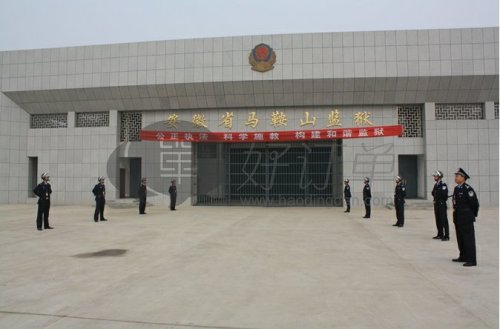
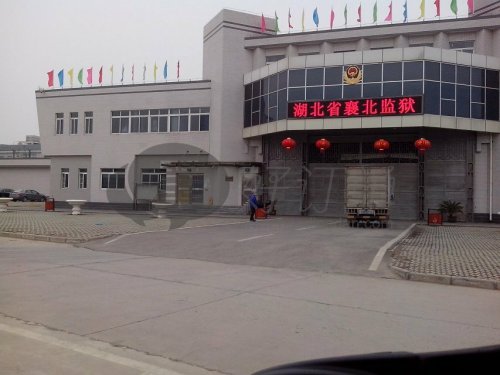
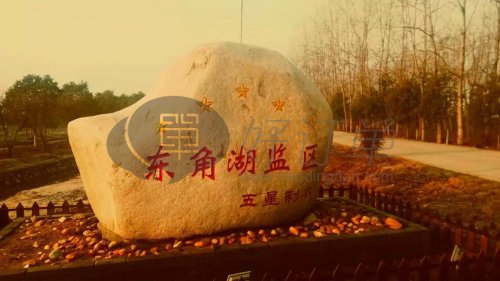
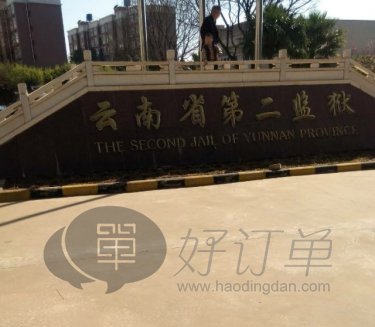
Hangzhou Z-shine industrial Co., Ltd.
Address: 21st Floor, Section A, UDC Times Tower, Hangzhou
TEL: 86-571-81101588 / 86505081
FAX: 86-571-81101599
After-sales services QQ: 1146639341
E-mail: support@zshine.com.cn
Website:http://www.pepevega.com/
1.2 Zhejiang Province No. 1, No. 4, No. 5 and No. 7 Prisons and Quzhou Haolong Clothing Co., Ltd.
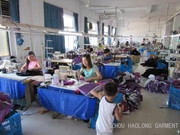
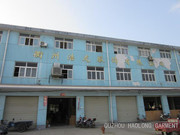
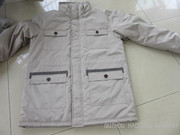
Quzhou Haolong Clothing Co., Ltd. has clearly stated in its advertisement seeking clients for cooperation that the company’s orders are mainly filled by their own factories and several prisons. Our investigation has confirmed that the prisons processing clothes for this company include Zhejiang Province No. 1, No. 4, No. 5 and No. 7 Prisons, with over 20,000 workers. Below is a letter from Johnny, the company’s contact person, to introduce the company:
Please see the attached factory profile:
The majority of the orders that our factory receives are FOB US dollar total distribution orders, which account for 70% of the total production. External processing contracts are 20% and the other 10% are domestic sales orders.
1: Our factory mainly produces tatted garments: down jackets, cotton-padded jackets, outdoor jackets, work uniforms, windbreakers, mountaineering wear, outdoor clothing and casual pants
Major markets: France, the European market, the United States
Brand clients: French brands: Father & Sons, Armand Thiery, Cyrillus, Harrington, Galeries Lafayette, Bayard, ODB and American Vintage; US brands: Allen Allen USA and Micros.
Annual production: 20,000,000 pieces of clothing.
2: Our factory’s products are mainly sold on the French market (70% of all products), the US market (20%) and the domestic market (10%). On the US market, we are currently producing only a few brands, which are sold under the COSCO framework.
3: Our commissioned Prisons: Zhejiang Province No. 1 Prisons: Prison terms of over 20 years and life imprisonment; Shilifeng Prison (Shilifeng Prison belongs to Zhejiang Province No. 4, No. 5 and No. 7 Prisons with a total of around 12,000 prisoners. Due to short prison terms, there is personnel turnover): From 5 to 20 years of imprisonment. The total number of prisoners is around 20,000, and they are all in a healthy state.
The above is a general introduction. If needed, we will always keep in touch.
Best Regards,
Johnny
Tel: (0086)570-3866602
Mob:(0086) 189 0581 1375
Skype: johnny08601
Quzhou Haolong Clothing Co., Ltd
Zhejiang Jiusheng Import and Export Co., Ltd.
The following table shows the types of products and contact information listed on the website of Quzhou Haolong Clothing Co., Ltd.
| Main products or services: | Cotton-padded jackets, jackets, casual pants, work uniforms, knitted garments | Main industry: | Garments |
|
Type of enterprise: |
Sole proprietorship | Business model: | Manufacturing, trade |
|
Registered address: |
Quzhou City, Zhejiang Province |
Business ddress: |
Fuyuan New Village, Garden Street, Kecheng District, Quzhou, Zhejiang Province |
|
Date of Establishment: |
May 5, 2010 |
Legal representative/person in charge: |
Fu** |
|
Number of employees: |
91 - 100 | Annual Sales: |
10 million - 20 million yuan |
| Brands: |
From Europe, the US,Germany, ussia,Poland |
Registered capital: | 1,050,000,500 yuan |
| Major customer base: |
Foreign companies’ offices in China, final buyers, trading companies |
Major markets: |
Western Europe, South America, North America, Hong Kong, asternEurope, East Asia, Southeast Asia |
|
Annual Exports: |
30 million to 50 million yuan |
Annual Imports: | Less than 100,000 yuan |
| Bank: | Quzhou Bank | Bank Account: | 12**** |
| OEM services offered? | Yes |
Number of Employees in the R&D department: |
11 - 20 人 |
|
Monthly Output: |
5,000,000 pieces | Factory Area: | 5,000 square meters |
Contact Information
Contact person: Johnnymanager
Address: Fuyuan New Village, Garden Street, Kecheng District, Quzhou, Zhejiang Province, ChinaS
Phone: 0570-88301245
Mobile: 18905811375
1.3 Jiamusi Prison and Zhejiang Goodbrother Shoes Co., Ltd.
In 2011, Jiamusi Prison forced the detainees at the first, initial, fifth and eighth prison wards (the 9th ward was closed) to manually make men’s and women’s leather sandals, semi-finished sneakers (without soles, which are added after being exported to Russia). The manufacturer name marked on the shoes is Zhejiang Goodbrother Shoes Co., Ltd. Their English trademark is Coollook. Please see below for the trademark and product information.[24]
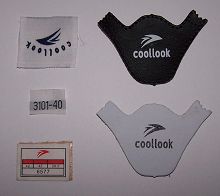
The shoes’ raw materials are from Dalian. The plate number of the freight truck, which is used to transport raw materials and semi-finished shoes, is HeiC89165 (黑C89165), indicating that it’s from Dongning County, Mudanjiang City in Heilongjiang Province. Dongning County is one of the counties with a relatively large trade volume with Russia. The truck driver’s cellphone number is 13946375897.[25]
The following is the production information regarding some shoes manufactured during a certain period:
Item No. A585, black, 700 pairs;
Item No. K232, brown, cream, 900 pairs;
Item No. 0587, cream, black, 1,400 pairs;
Item No. 8211, black, 300 pairs;
Item No. 2731, black, 600 pairs;
Item No. 5023, brown, 2,000 pairs;
Item No. 5025, black, white, beige, 2,600 pairs;
Item No. 3101, blue, black, total 10,000 pairs;
Item No. 6577, black, white, total 3,000 pairs;
Item No. 6378, white, total 3,000 pairs.
Two kinds of glues are used to manufacture the shoes: One glue is white, called 103 powder slurry, with a pungent smell, which irritates and hurts the eyes; the other glue is yellow and also with a pungent odor. People’s hands would peel after being in contact with this glue.[26]
1.4 Liaoning Province Women’s Prison and related companies
Liaoning Province Women’s Prison has cooperated with Basic House (South Korean clothing brand), Bang Bang (South Korean clothing brand), ABC (children’s clothing brand), Semir (clothing brand), KFC, McDonald’s, Shenyang Toly Food Co., Ltd, Holiland (pastry brand), and Shenyang’s Yisheng Health Appliances Development Co. Ltd.
The former third division (changed to be the first division in 2011) of Liaoning Province Women’s Prison did textile processing in the name of “Shenyang Ningda Garment Factory” (for details, please see the list of “Prisons with Slave Labor Production in the Name of Companies”). Except for the hospital and kitchens, all other 13 divisions have manufacturing workshops. New prisoners and teenage prisoners mostly work on producing cotton swabs. The seventh division (with nearly 500 inmates) make a large amount of slave-labor products for Basic House, Bang Bang, ABC and Semir, generating a net profit of over 30 million yuan (4.5 million USD) each year.[27] The ninth division has paper product manufacturing workshops, mostly making fast-food boxes for KFC and McDonald’s, as well as gift boxes for Shenyang Toly Food Co., Ltd and Holiland. The fourth team of the tenth division works on making cosmetic products, as well as doing related processing work, including filling, lidding, numbering, boxing, labeling, sealing, packaging and warehousing the cosmetic vials/boxes. Other slave-labor products include sweaters,[28] handicrafts, medical supplies, beauty supplies, food and gardening supplies.[29] Some of these divisions also make clothes.
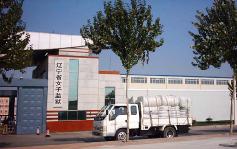 |
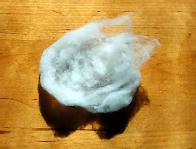 |
| A truck delivering raw materials for slave labor work in Liaoning Province Women’s Prison (October 2005) | The raw material “silk cotton” for down-jacket processing |
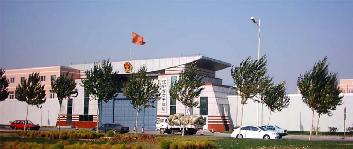
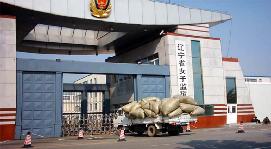
A truck delivering silk cotton (raw materials for down-jacket processing) to the ninth division entered Liaoning Province Women’s Prison[30]
The photo below shows that a truck loaded with raw materials for slave labor production parked at the entrance of Liaoning Province Women’s Prison. There were printed characters on the cartons which read “Jintianyu” Magnetic Vibration Series Healthcare Products. The manufacturer is Shenyang’s Yisheng Health Appliances Development Co. Ltd. (Address: 79 Sanhao Street, Heping District, Shenyang, China; Tel: 024-22948660, 024-22947708; postal code: 110004)[31]
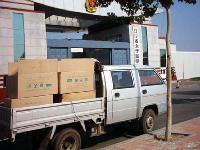
1.5 Shanghai Women’s Prison and related companies
Shanghai Women’s Prison has cooperated with Yihai Kerry Foodstuff Marketing Co., Ltd, Shanghai Jahwa Corporation, KFC and Feidiao Electrical Appliances (Group) Co., Ltd.
(1) Yihai Kerry Foodstuff Marketing Co. employs Shanghai Women’s Prison to knot labels for its “Arowana” brand products. Knotting labels for “Arowana” products is a long-term slave labor activity in Shanghai Women’s Prison. The fifth brigade of the prison has been illegally detaining several dozen Falun Gong practitioners. Their daily labor activities are mostly to knot labels for “Arowana” products, and they must finish 5,400 labels each day. Falun Gong practitioners are often forced to do this kind of labor activities for several consecutive months, leading to skin loss, bleeding, pus oozing and calluses on their fingers due to rubbing. To enhance productivity, the prison forces slave workers to eat, sleep, work and even urinate/defecate in their cells.[32]
“Arowana” brand products and their labels:
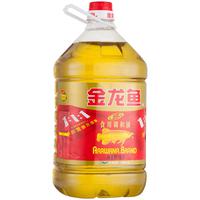
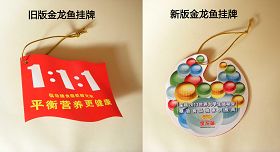
Yihai Kerry Foodstuff Marketing Co., Ltd
Phone: 0755-66863888
Fax: 0755-61864615
Website: www.jinlongyu.cn
(2) Other known brands that are involved in slave labor in this prison include Gillette (paper boxes for razor blades), Shanghai Jahwa Corporation (paper packaging boxes for cosmetics), KFC (coupons), and Feidiao Electrical Appliances (switches). Slave products for unknown brands include hand-made clothing and hand-knit sweaters.

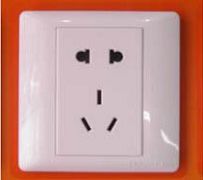
KFC couponsFeidiao brand switch
1.6 Heilongjiang Tailai Prison and South Korean brand Missha
Missha (Chinese name: Mishang) is a South Korean brand.
Production process:[33]
A. Separating bundles of false eyelashes into small rolls.
B. Making mesh-like eyelashes (Fig. 2A): use tweezers to put every single eyelash into the mold (Fig. 1), then merge two slices of eyelashes into one (Fig. 2A). This work is very harmful to the eyes, likely to cause nearsightedness or farsightedness to worsen. The prisoners are forced to work for over 10 hours per day to produce 200-300 slides.
Making circular-sector shape eyelashes (Fig. 2B): draw a schematic-like hill with valleys and peaks, then place eyelashes one by one onto the drawing until it’s completely covered.
|
|
|
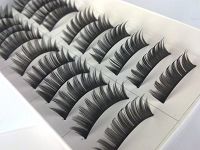
Figure 2B: circular-sector shape false eyelashes |
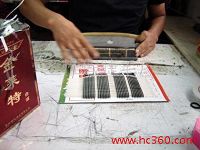 Figure 3: semi-finished products |
(All images are from the Internet)
C. Design Finalization: brush the tape part of the semi-finished products with a kind of glue, which emits an irritating odor (likely a carcinogenic), then attach two glue-dipped black lines to the upper and lower parts respectively. The product is then put into a modified large oven (originally a baker’s oven with multiple layers). The odor of the baking glue is very irritating to the nose, forcing out tears and suppressing appetite. In the winter, all windows and doors are shut, which makes it even harder to tolerate the smell.
D. Cut the eyelashes from the tape part and attach to the product package as illustrated in Fig. 4.

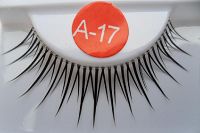
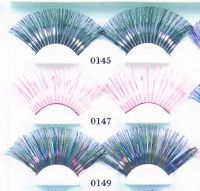
Figure 4: finished products (from the Internet)
1.7 Shanghai prisons, Shanghai forced labor camps and related companies
Shanghai prisons and forced labor camps have cooperated with GOFFA, TOPVALU, AEON Co., Ltd. and Shanghai Xinhua Toy Co. Ltd.
1. Shanghai prisons and forced labor camps have produced plush toys for exports. One company that has imported these toys is a brand called GOFFA. The company is registered in Brooklyn, New York City in the U.S. The company’s full name and address is “GOFFA INT’L CORP BROOKLYN, NY, 11206”. The toys have labels printed with “RECOMMENDED FOR CHILDREN”.[34]
2. Shanghai prions and forced labor camps have also produced clothing for exports. One company that has imported these products owns a pajama brand called “TOPVALU” (“トップバリュ” in Japanese). The products are labeled for the Japanese company “AEON” (TOPVALU is a brand affiliated to AEON). The service hotline on the labels is 0120-28-4196 (a Japanese phone number). There are many other brands importing these slave worker products continuously and in large quantities.[35]
3. Shanghai Xinhua Toy Co. Ltd. used to contract around 120 inmates of Shanghai Women’s Labor Camp as employees. Among them, 70 were lathe operators and 40-50 were back-end workers.
Shanghai Xinhua Toy and Gift Co. Ltd.
Legal representative: Ye Hong (叶弘)
Company type: Chinese-Foreign Contractual Joint Venture
Major Business: toy manufacturing
Registered capital: 210,000 yuan (approximately $32,300)
Phone number (fax): 021-64500863
Postal code: 201109
Address: 189 Huxing Road, Qibao Town, Minhang District, Shanghai
021-64500863
021-64781161
1.8 Collaboration between Shanghai Tilanqiao Prison and Shanghai Soap Co., Ltd., Shanghai Jahwa Corporation
Bee & Flower Sandalwood Soap is an old brand owned by Shanghai Soap Co., Ltd., whereas MAXAM is a brand affiliated to Shanghai Jahwa Corporation. Both brands have some products exported to Southeastern Asia and countries in other regions. Parts of the production processes of soaps and other cleaning products of both brands, however, is done in mass quantities in prisons at Tilanqiao and other places in Shanghai.[36] In addition, during China’s SARS outbreak in 2003, a large amount of medicated soaps (Fig. 3) were supplied to the market. Many inmates of Tilanqiao Prison had worked overtime to process that kind of medicated soaps for Shanghai Soap Co., Ltd.[37]
One procedure to produce Bee & Flower Sandalwood Soaps is carried out at Tilanqiao Prison. It is to attach two belt-like product manuals and name tags (Fig. 1-1 and 1-2), and then attach two round trademark stickers (Fig. 1-3 and 1-4) onto a soap package.

Figure 1: Bee & Flower Sandalwood Soaps (several types of soaps frequently processed at Shanghai’s Tilanqiao Prison)
Production procedures:
(1) Bee & Flower Sandalwood Soaps: each day, the slave laborers would package big soaps into over 70 boxes (72 soaps per box) or small soaps into more than 30 boxes (144 soaps per box). Each day, they would need to package around 5,500 soaps. Before attaching the manuals and tags onto the soap packages, the workers would need to prepare the materials, including folding one-page manuals into a belt-shape and folding paper boxes to contain the finished products. There were two kinds of paper boxes, which could contain 12 or 4 soaps respectively. Sometimes, workers would also need to attach product serial number stickers to soaps in full English packaging. Many inmates have to work during their breaks to finish their assigned quotas.
(2) MAXAM products: the inmates mostly work on packaging soaps (Fig. 2); they also used to work on packaging liquid hand soaps.[38]
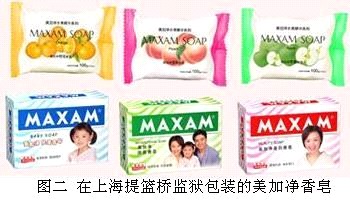

Figure 2: MAXAM soaps processed in Shanghai Tilanqiao Prison Figure 3
Reference:
[1] WOIPFG. Investigative Report on Slave Labor in Chinese Labor Camps Holding Falun Gong Practitioners (Part I). October 16, 2003. http://www.upholdjustice.org/node/94
[2] WOIPFG. Investigative Report on Slave Labor in Chinese Labor Camps Holding Falun Gong Practitioners (Part II). April 5, 2004. http://www.upholdjustice.org/node/95
[3] Minghui.org. Investigative Report on Slave Labor in Prisons in Communist China. July 22, 2014.
http://www.minghui.org/mh/articles/2014/7/22/中共监狱奴工劳动调查报告-294957.html
[4] Minghui.org. Slave Labor Persecution at Fanjiatai Prison in Shayang County, Hubei Province. July 5, 2012. http://www.minghui.org/mh/articles/2012/7/5/湖北沙洋范家台监狱的奴工迫害(图)-259733.html
[5] Minghui.org. Slave Labor Persecution at Fanjiatai Prison in Shayang County, Hubei Province. July 5, 2012. http://www.minghui.org/mh/articles/2012/7/5/湖北沙洋范家台监狱的奴工迫害(图)-259733.html
[6] Minghui.org. Slave Labor Persecution at Fanjiatai Prison in Shayang County, Hubei Province. July 5, 2012. http://www.minghui.org/mh/articles/2012/7/5/湖北沙洋范家台监狱的奴工迫害(图)-259733.html
[7] Minghui.org. Slave Labor at Liaoning Women’s Prison—Products Exported to Korea, Canada. May 7, 2013. http://en.minghui.org/html/articles/2013/5/7/139265.html
[8] Minghui.org. Atrocities behind the Products Made by Slave Labor in Inner Mongolia Women’s Prison. March 17, 2012. http://en.minghui.org/html/articles/2012/3/17/132139.html
[9] Minghui.org. Brand Name Clothes Made in Shandong Women’s Prison for Export. August 7, 2012. http://en.minghui.org/html/articles/2012/8/7/134837.html
[10] Minghui.org. The Truth about Products Made Under Slave Labor Conditions in Hebei Province Women's Prison and Forced Labor Camp. April 6, 2012.
[11] Minghui.org. Massive and Exploitive Slave Labor Operations in the Jilin Prison System. March 18, 2013. http://en.minghui.org/html/articles/2013/3/31/138685.html
[12] Minghui.org. Massive and Exploitive Slave Labor Operations in the Jilin Prison System. March 18, 2013. http://en.minghui.org/html/articles/2013/3/31/138685.html
[13] Minghui.org. Massive and Exploitive Slave Labor Operations in the Jilin Prison System. March 18, 2013. http://en.minghui.org/html/articles/2013/3/31/138685.html
[14] Minghui.org. Massive and Exploitive Slave Labor Operations in the Jilin Prison System. March 18, 2013. http://en.minghui.org/html/articles/2013/3/31/138685.html
[15] Minghui.org. Massive and Exploitive Slave Labor Operations in the Jilin Prison System. March 18, 2013. http://en.minghui.org/html/articles/2013/3/31/138685.html
[16] Minghui.org. Massive and Exploitive Slave Labor Operations in the Jilin Prison System. March 18, 2013. http://en.minghui.org/html/articles/2013/3/31/138685.html
[17] Minghui.org. Massive and Exploitive Slave Labor Operations in the Jilin Prison System. March 18, 2013. http://en.minghui.org/html/articles/2013/3/31/138685.html
[18]Minghui.org. Massive and Exploitive Slave Labor Operations in the Jilin Prison System. March 18, 2013. http://en.minghui.org/html/articles/2013/3/31/138685.html
[19]Minghui.org. Massive and Exploitive Slave Labor Operations in the Jilin Prison System. March 18, 2013. http://en.minghui.org/html/articles/2013/3/31/138685.html
[20]Minghui.org. Slave Labor Persecution at Fanjiatai Prison in Shayang County, Hubei Province. July 5, 2012. http://www.minghui.org/mh/articles/2012/7/5/湖北沙洋范家台监狱的奴工迫害(图)-259733.html
[21] Hangzhou Z-shine industrial Co., Ltd.
http://www.zshine.com.cn/
https://www.ajinga.com/company-detail-new/1800/
[22] Hangzhou Z-shine industrial Co., Ltd.
http://www.zshine.com.cn/,
https://www.ajinga.com/company-detail-new/1800/
[23] FOB Business Forum.
http://bbs.fobshanghai.com/archiver/tid-6001514.html
[24] Minghui.org. Some Slave Labor Products from Heilongjiang Province’s Prisons and Labor Camps. June 12, 2012. http://www.minghui.org/mh/articles/2012/6/12/黑龙江省监狱、劳教所部份奴工产品(图)-258807.html
[25] Minghui.org. Some Slave Labor Products from Heilongjiang Province’s Prisons and Labor Camps. June 12, 2012. http://www.minghui.org/mh/articles/2012/6/12/黑龙江省监狱、劳教所部份奴工产品(图)-258807.html
[26] Minghui.org. Some Slave Labor Products from Heilongjiang Province’s Prisons and Labor Camps. June 12, 2012. http://www.minghui.org/mh/articles/2012/6/12/黑龙江省监狱、劳教所部份奴工产品(图)-258807.html
[27] Minghui.org. Liaoning Women’s Prison: Forced Labor Until the Last Breath. February 27, 2014. http://en.minghui.org/html/articles/2014/2/27/145625.html
[28] Minghui.org. Liaoning Women’s Prison: Forced Labor Until the Last Breath. February 27, 2014. http://en.minghui.org/html/articles/2014/2/27/145625.html
[29] Minghui.org. Liaoning Women’s Prison Encourages Prisoners to Torture Falun Gong Practitioners. July 2, 2016. http://www.minghui.org/mh/articles/2016/7/2/辽宁女子监狱怂恿犯人折磨法轮功学员-330803.html
[30] Minghui.org. Liaoning Provincial Women’s Prison Treats Falun Gong Practitioners as Slave Laborers. November 5, 2005. http://en.minghui.org/emh/articles/2005/11/5/66534.html
[31] Minghui.org. Liaoning Provincial Women’s Prison Treats Falun Gong Practitioners as Slave Laborers. November 5, 2005. http://en.minghui.org/emh/articles/2005/11/5/66534.html
[32] Minghui.org. The Forced Labor Persecution behind the Jin-long-yu (Gold Dragon Fish) Brand. January 13, 2012. http://en.minghui.org/html/articles/2012/1/13/130684.html
[33] Minghui.org. Exposing the Slave Labor Products Made in Heilongjiang Tailai Prison. February 9, 2013. http://www.minghui.org/mh/articles/2013/2/9/曝光黑龙江省泰来监狱的奴工产品(图)-269357.html
[34] Minghui.org. Prisons and Labor Camps in Shanghai Continue to Produce Large Quantities of Products for Export with Forced Labor. August 10, 2007.
http://en.minghui.org/emh/articles/2007/8/10/88486.html
[35] Minghui.org. Prisons and Labor Camps in Shanghai Continue to Produce Large Quantities of Products for Export with Forced Labor. August 10, 2007.
http://en.minghui.org/emh/articles/2007/8/10/88486.html
[36] Minghui.org. Investigative Report on Slave Labor in Prisons in Communist China. July 22, 2014. http://www.minghui.org/mh/articles/2014/7/22/中共监狱奴工劳动调查报告-294957.html
[37] Minghui.org. Investigative Report on Slave Labor in Prisons in Communist China. July 22, 2014.
http://www.minghui.org/mh/articles/2014/7/22/中共监狱奴工劳动调查报告-294957.html
[38] Minghui.org. Investigative Report on Slave Labor in Prisons in Communist China. July 22, 2014.
http://www.minghui.org/mh/articles/2014/7/22/中共监狱奴工劳动调查报告-294957.html





